Overview
Designing trials in Paraguay presents significant challenges, including:
- The navigation of complex regulatory requirements
- The optimization of patient recruitment
- The necessity for cultural sensitivity in study protocols
Addressing these obstacles is paramount for the advancement of clinical research in the region. Solutions outlined in the article emphasize the importance of:
- Aligning processes with local regulations
- Employing comprehensive community engagement strategies
- Adapting trial protocols to fit local contexts
These approaches are essential for enhancing the effectiveness and efficiency of clinical research efforts in Paraguay.
Introduction
Navigating the intricate landscape of clinical trials in Latin America necessitates a nuanced understanding of local regulations, cultural sensitivities, and effective stakeholder communication. As Medtech companies strive to introduce innovative medical devices to market, the role of organizations like bioaccess® becomes increasingly pivotal. This article delves into the multifaceted strategies employed by bioaccess® to streamline clinical trial processes, enhance patient recruitment, and ensure compliance with evolving regulatory standards.
By leveraging local insights and fostering collaboration among stakeholders, bioaccess® not only improves trial outcomes but also positions regions like Barranquilla as emerging hubs for clinical research. Through a steadfast commitment to quality, cultural competence, and continuous evaluation, the organization is paving the way for advancements in healthcare that resonate with diverse populations.
bioaccess®: Overcoming Regulatory Hurdles in Clinical Trials
The company has cultivated a profound understanding of Paraguay's regulatory landscape, which has undergone significant changes in recent years. By aligning their processes with local regulations, they empower Medtech companies to effectively navigate the complexities of approval processes. This includes a thorough comprehension of the specific requirements established by DINAVISA, the national health authority, which is essential for expediting the approval process.
As we look towards 2025, the evolving regulatory framework presents challenges in designing trials for Paraguay, along with opportunities for market entry. Companies that successfully adapt to these changes can substantially reduce their time to market for new medical devices. For instance, grasping the intricacies of DINAVISA's approval process for studies is crucial; recent data indicates that firms leveraging expertise in comprehensive study management services—including:
- feasibility assessments
- site selection
- compliance evaluations
- setup
- project oversight
have experienced improved approval timelines. Notably, the investment in Paraguay by CIFARMA reflected an annual increase of 10%, demonstrating a growing interest in the market.
Furthermore, the partnership between a health organization and Caribbean Health Group to establish Barranquilla as a leading location for medical studies in Latin America, supported by Colombia's Minister of Health, illustrates the proactive strategies necessary to navigate the challenges in designing trials for Paraguay.
As Julio Martinez-Clark observed, "These companies are, in essence, looking for fast regulatory approval, ease of patient recruitment, and cost savings." As the landscape transforms, employing effective strategies to navigate DINAVISA regulations will be vital for fostering innovation and ensuring compliance in research across Paraguay.
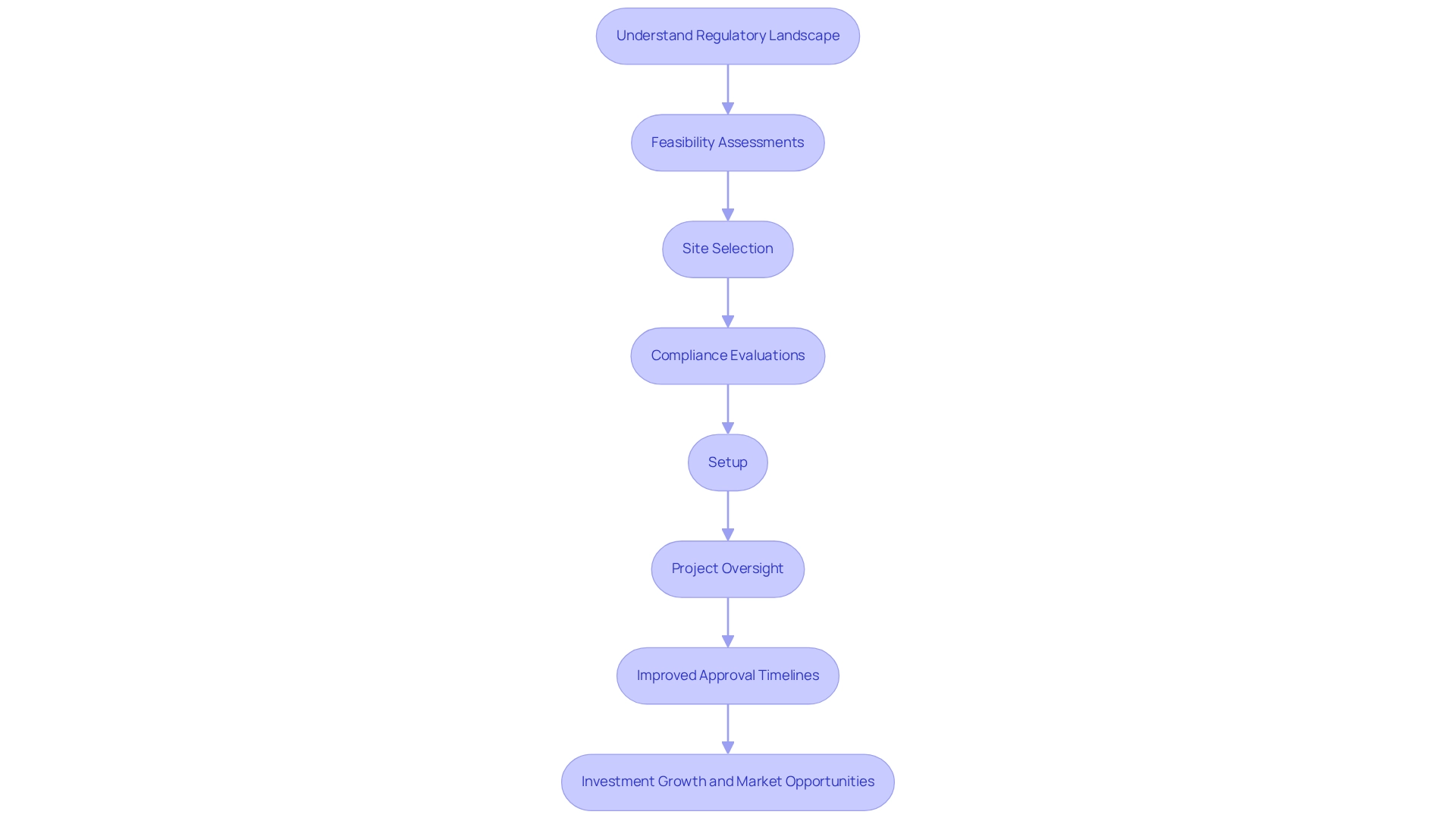
Enhance Patient Recruitment Strategies for Clinical Trials
To optimize patient recruitment, bioaccess® employs a comprehensive strategy that prioritizes community engagement, collaboration with local healthcare providers, and targeted outreach initiatives. Our service capabilities encompass feasibility studies, site selection, compliance reviews, study setup, import permits, project management, and reporting, ensuring a thorough approach to research. By leveraging digital platforms and social media, the organization effectively connects with potential participants, thereby ensuring a broader reach. A crucial element of this method is nurturing trust among communities, which is essential for promoting involvement in research studies. As Ajay Singh, senior associate dean for postgraduate medical education at Harvard Medical School, notes, "The consequences from Tuskegee have been devastating because it generated a lot of distrust among the African-American population." This trust-building is vital for gathering diverse and representative data, ultimately enhancing the quality and reliability of research outcomes.
In Paraguay, where language barriers can complicate communication, bioaccess® highlights the challenges in designing trials for Paraguay by emphasizing the importance of culturally sensitive outreach. Involving community leaders and healthcare experts aids in addressing the challenges in designing trials for Paraguay, enabling clearer dialogue regarding the significance of medical studies. Successful community engagement initiatives have demonstrated that when communities are informed and involved, participation rates can significantly increase.
Statistics indicate that effective patient recruitment strategies can lead to a 15-20% yearly rise in research participation, underscoring the importance of these initiatives. Moreover, research suggests that organizations adopting robust community engagement strategies experience a substantial enhancement in recruitment effectiveness, which is essential for the timely completion of studies.
In partnership with Caribbean Health Group, the organization is striving to establish Barranquilla as a prominent location for clinical studies in Latin America. This partnership aims to enhance the recruitment process by leveraging local healthcare networks and resources, ultimately driving economic growth and healthcare improvement in the region. By concentrating on these strategies, the organization not only improves patient recruitment but also contributes to the advancement of medical technology in the region.
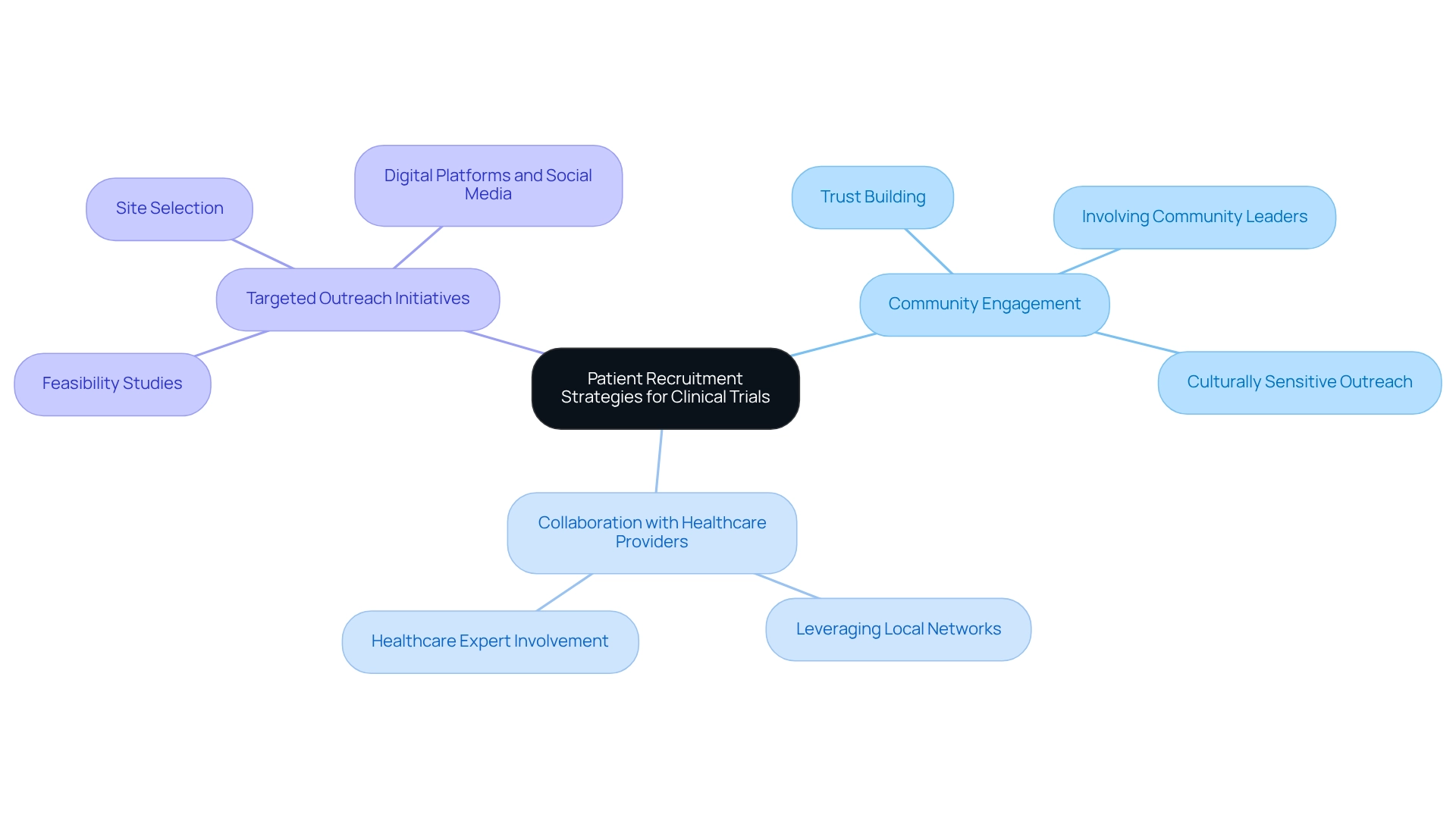
Incorporate Cultural Sensitivity in Trial Design
Incorporating cultural sensitivity into study design is essential for understanding the beliefs, values, and health practices of local populations. Bioaccess® actively partners with local stakeholders, such as the Caribbean Health Group, to create research protocols that resonate culturally, particularly in regions like Barranquilla, Colombia, which is being positioned as a premier location for studies in Latin America. This approach encompasses the use of local languages in study materials and training staff in cultural competence, fostering trust and rapport with participants.
Research indicates that culturally aware methods can significantly improve retention rates in studies, as participants feel more valued and understood. For instance, studies have shown that experiments designed with cultural considerations can lead to enhanced recruitment and retention outcomes, especially within diverse communities. Recent findings reveal that:
- 20% of studies focused on sickle cell disease
- 16% on aging and Alzheimer's disease
These underscore the necessity for culturally tailored approaches in these areas. As Odney Eese noted, "This official research statement emphasizes the importance of cultural competence in enhancing relationships between minority communities and the drug development industry."
By emphasizing cultural sensitivity and referring to continuous assessment methods for improving minority recruitment, the organization not only complies with ethical standards but also enhances the overall effectiveness of research in Latin America. Examples of culturally appropriate research protocols, such as community engagement initiatives and the incorporation of local health practices, further illustrate the practical application of these principles.
Furthermore, this organization provides extensive management services for studies, including:
- Feasibility assessments
- Site selection
- Compliance evaluations
- Setup
- Import permits
- Project oversight
- Reporting
By focusing on cultural competence and leveraging its extensive service capabilities, the organization can significantly enhance retention rates, ensuring that research initiatives are both effective and respectful of the communities they serve.
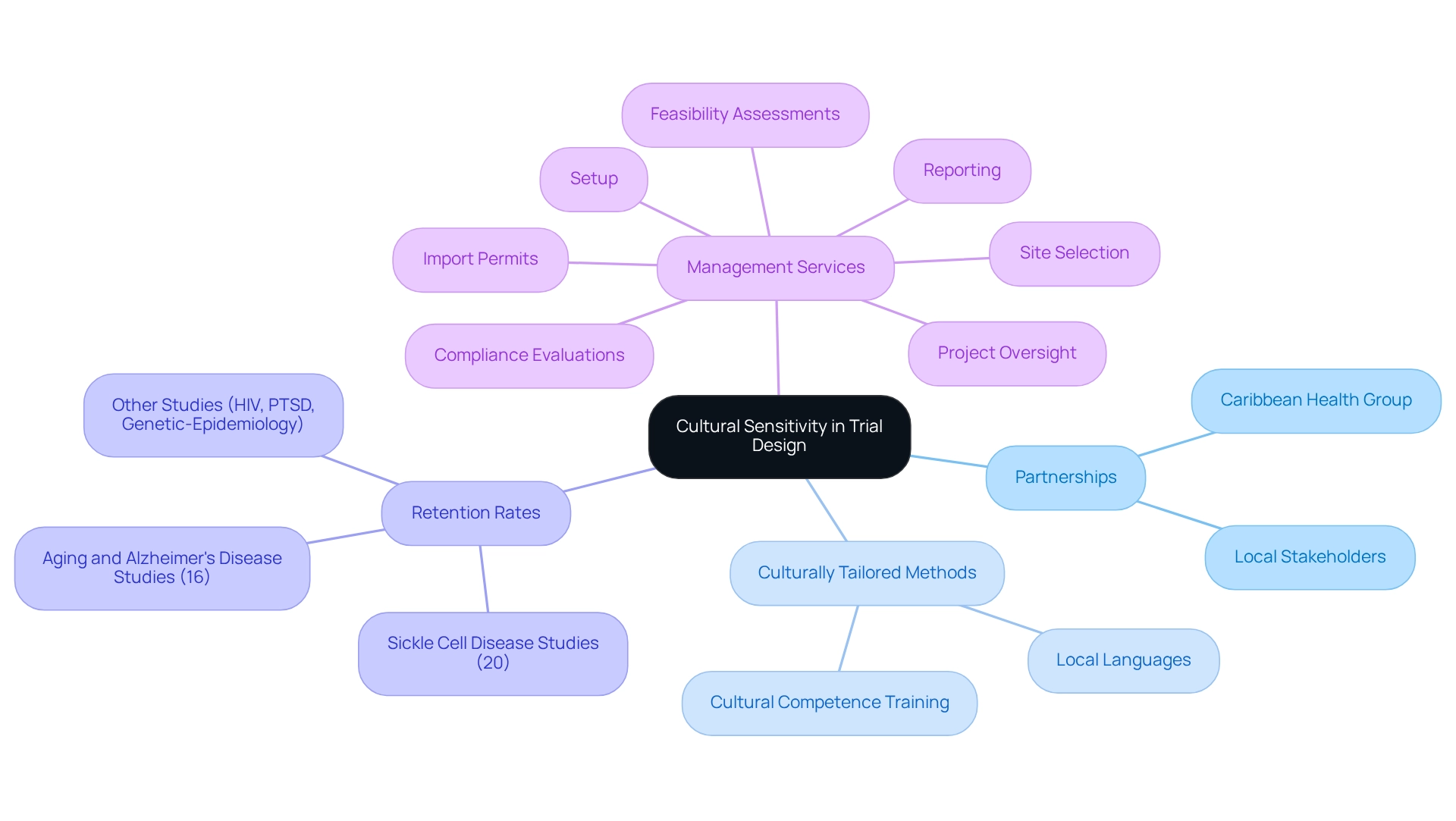
Improve Stakeholder Communication and Collaboration
bioaccess® underscores the critical role of transparent and consistent communication among all stakeholders in clinical studies, including sponsors, investigators, and regulatory bodies. Our comprehensive approach to medical device evaluations encompasses:
- Feasibility studies
- Site selection
- Compliance reviews
- Setup
- Import permits
- Project management
- Reporting
- Feedback on study documents
Frequent meetings and updates are vital for maintaining alignment on project goals and progress. By leveraging collaborative tools and platforms, such as project management software and communication applications, bioaccess® facilitates real-time communication, essential for swiftly addressing issues and ensuring transparency throughout the process.
Statistics reveal that effective stakeholder communication can significantly enhance outcomes; for example, sustained engagement with communities has been shown to improve health results and boost research participation. Conversely, ineffective communication can lead to substantial costs, such as the average $1,200 expense per screen malfunction, highlighting the financial implications of inadequate stakeholder involvement in research studies. Case studies suggest that the success of patient engagement is often more influenced by team expertise and leadership support than by the formal structure of the organization. As one Study Coordinator remarked, "It’s really hard work in terms of it takes a lot of energy and time investment. You have to really stay connected with the community or you cannot just go in and out."
To enhance teamwork, a variety of tools designed for study management are employed, fostering communication and promoting a collaborative atmosphere among stakeholders. These tools not only enhance the efficiency of stakeholder communication but also contribute to the overall success of research studies, ultimately accelerating the journey from innovation to market. Furthermore, exploring diverse organizational structures for patient engagement can further illustrate how communication effectiveness is impacted, aligning with the emphasis on collaboration tools and strategies.
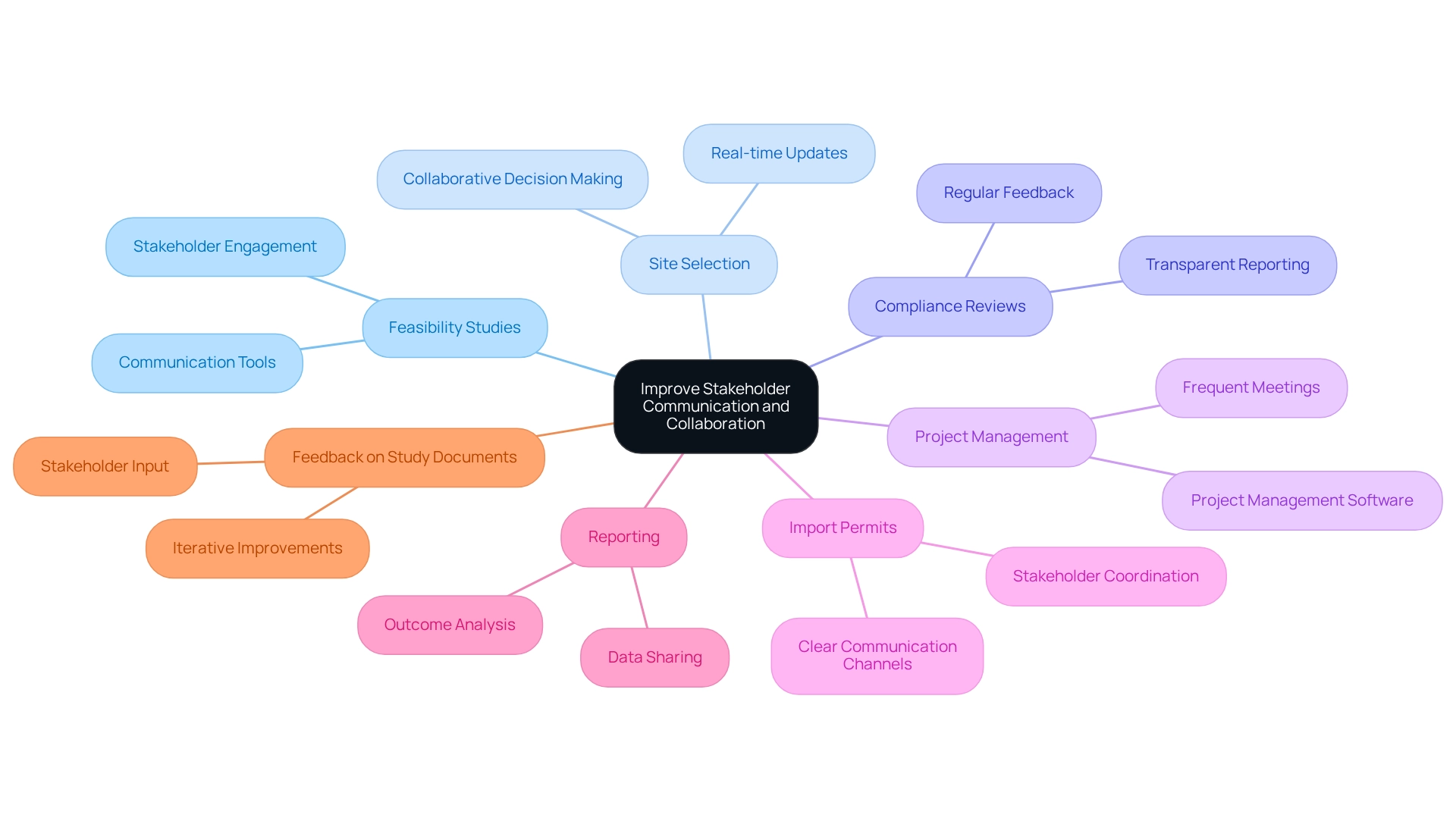
Leverage Real-World Data to Inform Trial Design
Leveraging real-world data (RWD) provides bioaccess® with critical insights into patient demographics and treatment patterns specific to Paraguay. This understanding is essential for guiding study design, as it aids in determining suitable endpoints and patient groups that reflect real-world scenarios. The integration of real-world evidence (RWE) enhances the significance of medical studies and strengthens regulatory submissions by illustrating the potential impact of medical devices in everyday healthcare environments.
The challenge of diagnosing conditions like depression exemplifies the need for improved diagnostic tools, which can be informed by RWD to gain a deeper understanding of symptom variability and treatment efficacy. Furthermore, collaboration among stakeholders is vital for the effective use of RWD, ensuring that the information collected is standardized and interoperable, thus promoting its application in research.
Given that the healthcare system generates approximately a zettabyte of information annually, utilizing this knowledge bridges the gap between research and daily healthcare practices, ultimately leading to more informed decision-making in Medtech studies. With comprehensive management services for studies—including Early-Feasibility Assessments, First-In-Human Studies, and Post-Market Assessments—RWD can be seamlessly integrated into study designs to enhance outcomes.
The FDA's expansion of the definition of RWE to include any data produced from any study framework underscores its importance in research design. Additionally, RWD plays a crucial role in identifying inappropriate medication use or dosing, facilitating improved patient management.
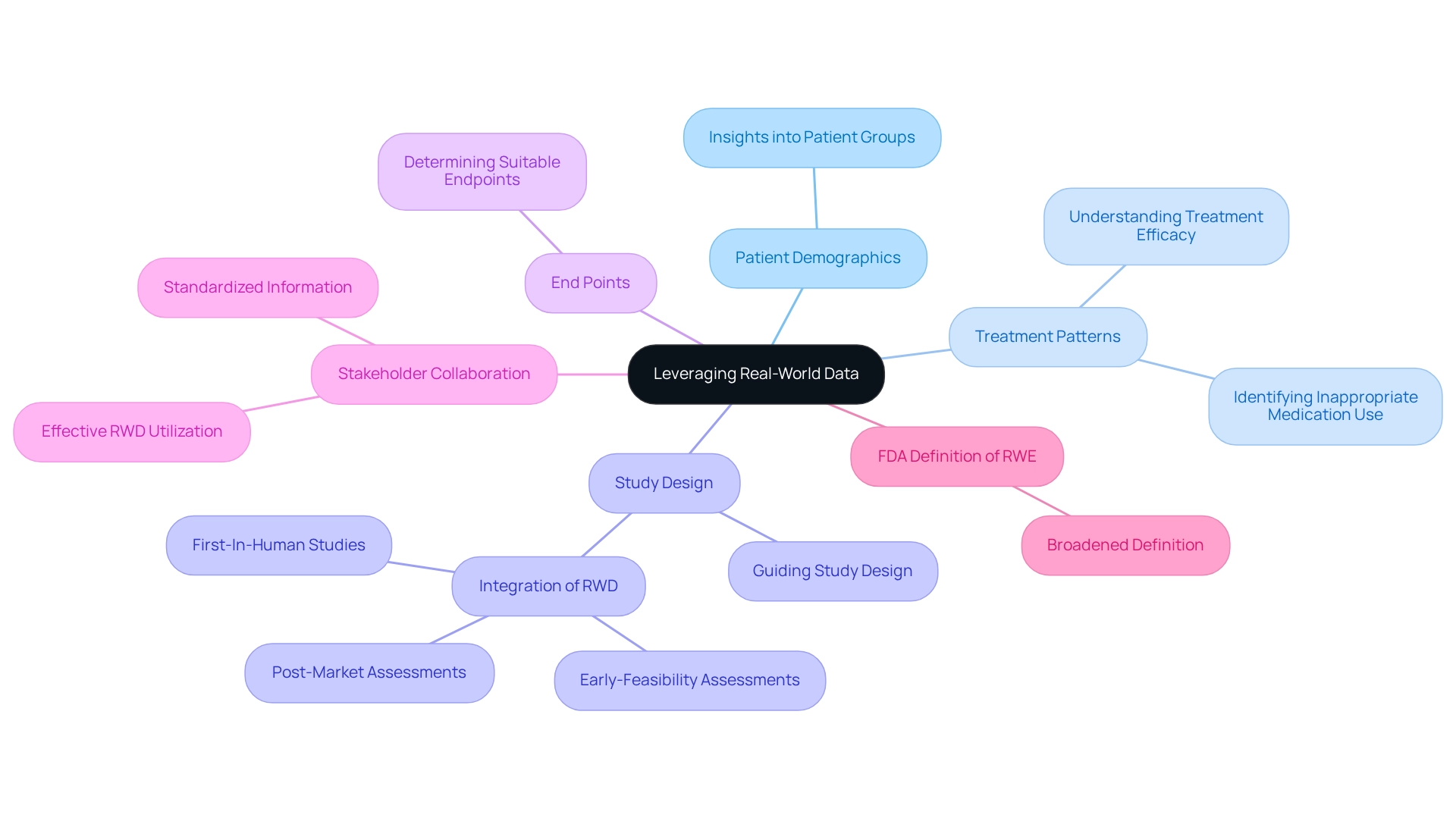
Ensure Compliance with Local Regulatory Requirements
The organization possesses a comprehensive understanding of Paraguayan research regulations, ensuring that all studies adhere to local laws. Through meticulous evaluations of experimental protocols and documentation, they align with DINAVISA standards, which are crucial for regulatory approval.
With over 20 years of experience in Medtech, the company offers extensive clinical trial management services, including:
- Early-Feasibility Studies
- First-In-Human Studies
- Post-Market Clinical Follow-Up Studies
As noted by Chambers Global, "The firm is extremely interconnected and collaborative and clients receive a consistent standard across all of Walkers' offices," which underscores their collaborative approach to regulatory compliance.
To further bolster compliance, the organization conducts regular training sessions for their staff, keeping them updated on the latest regulatory changes. This proactive strategy significantly mitigates the risk of non-compliance, which can result in delays in trial timelines.
For instance, a recent case study illustrated how a Medtech company adeptly navigated the intricacies of local regulations by leveraging bioaccess®'s expertise, leading to a streamlined approval process. Such strategies not only enhance compliance rates but also foster a culture of regulatory awareness within research teams, ultimately facilitating the advancement of medical devices in the region.
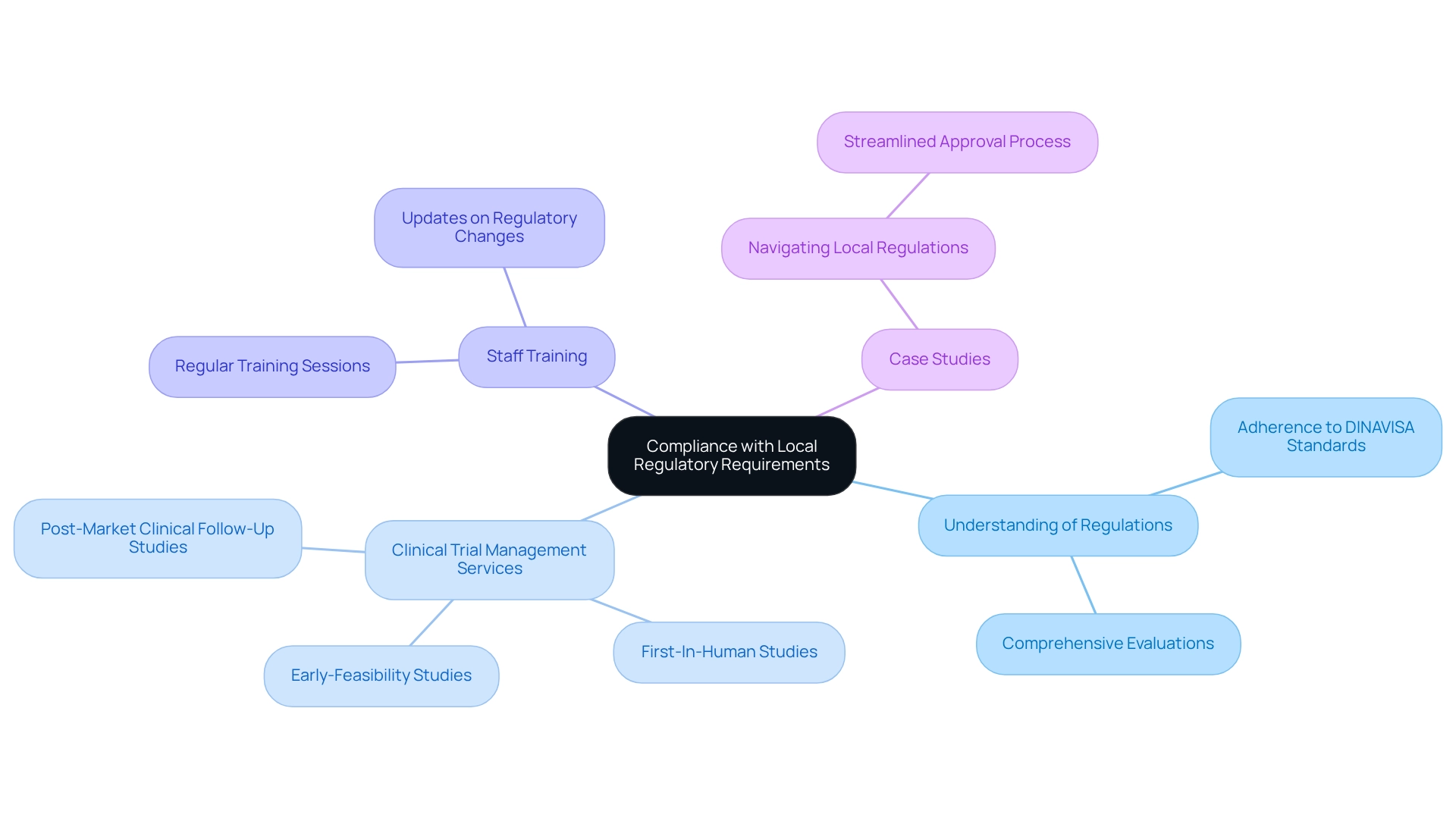
Adapt Trial Protocols to Local Contexts
Addressing the challenges in designing trials for Paraguay necessitates modifying clinical research protocols to fit the local context, which requires a thorough understanding of the healthcare infrastructure, patient demographics, and cultural nuances. bioaccess® collaborates actively with local healthcare providers to develop protocols that are not only feasible but also culturally relevant. This collaboration involves adjusting inclusion criteria, endpoints, and methodologies to better align with local practices and patient needs.
Such customized approaches significantly enhance the likelihood of success in studies by addressing the challenges in designing trials for Paraguay, as they ensure that the research is tailored to the specific characteristics of the population. For instance, considering the local healthcare infrastructure can lead to more effective recruitment strategies and improved patient retention, ultimately resulting in more reliable data and outcomes.
The ADAPTE toolkit, which offers 19 tools or instruments to help structure the guideline adaptation process, serves as a valuable resource for researchers in this endeavor. Furthermore, bioaccess's partnership with Caribbean Health Group to establish Barranquilla as a prominent location for medical studies in Latin America illustrates the organized assessment process required for customizing interventions efficiently.
As highlighted by Gynuity Health Projects, modifying service delivery models to address the requirements of particular populations is essential for enhancing the significance and impact of medical studies.
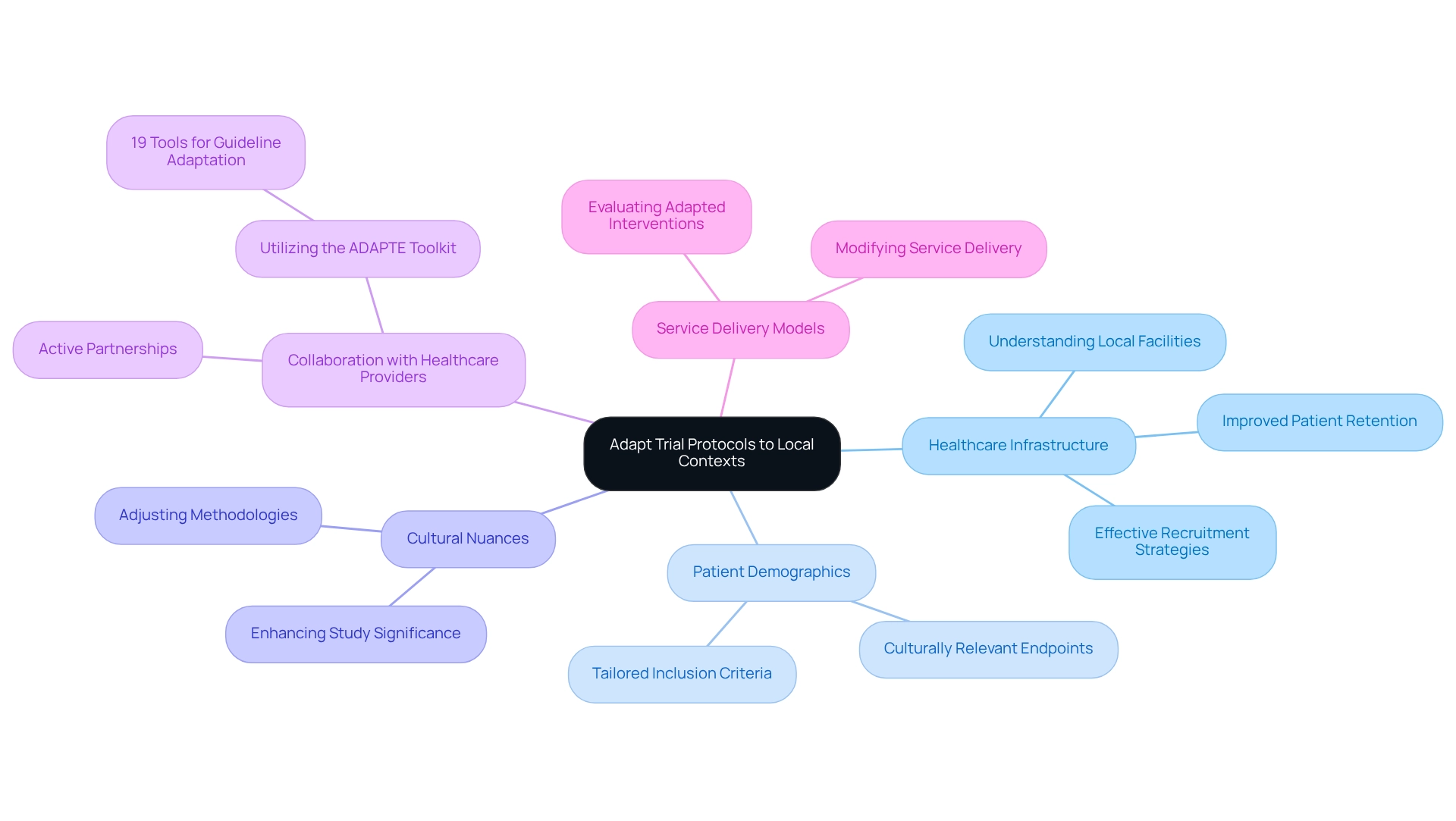
Streamline Logistics for Efficient Trial Execution
A strategic framework is implemented to enhance logistics in clinical studies, focusing on optimizing supply chains for investigational products. This involves ensuring prompt delivery to testing locations and efficient inventory oversight. By leveraging local resources and forming partnerships with logistics providers, bioaccess® minimizes delays and reduces costs, which is crucial for meeting timelines and budgets.
Notably, the collaboration with Caribbean Health Group aims to position Barranquilla as a leading site for medical studies in Latin America, supported by the Minister of Health's initiative to attract more research projects to the region.
Companies that refine their logistics processes can expect improved execution of experiments, as evidenced by case studies where prioritizing early-stage research led to a higher likelihood of technical success in initial discovery phases. Implementing best practices in supply chain management accelerates research timelines and enhances overall operational efficiency, ultimately facilitating the advancement of medical technologies in Latin America.
This company offers comprehensive management services for research studies, including:
- Feasibility assessments
- Site selection
- Compliance evaluations
- Study preparation
- Import licenses
- Project oversight
- Reporting
These services are essential for navigating the complexities of research in the region. This underscores the significance of trust and relationships in logistics management.
Overall, these insights emphasize the necessity for robust logistics strategies in the Medtech sector, particularly as Colombia establishes itself as a key location for research studies in Latin America.
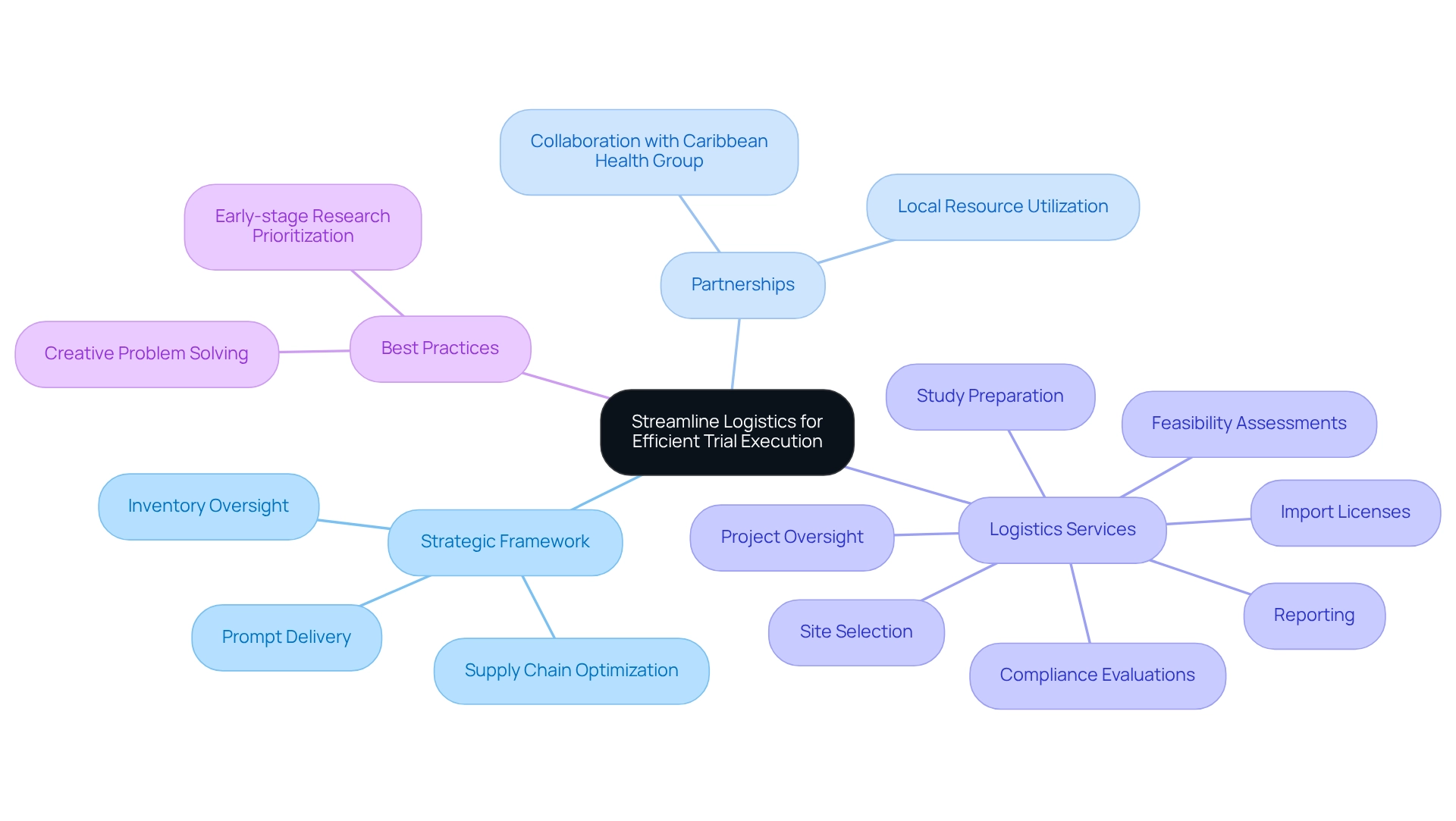
Train Local Staff for Quality Data Collection
To ensure the integrity of information gathering, the organization emphasizes comprehensive training programs for local personnel involved in clinical studies. These programs cover essential areas such as regulatory compliance, information management practices, and ethical considerations. By equipping local teams with the necessary skills and knowledge, bioaccess® significantly enhances the reliability of the information collected during trials. This emphasis on training is vital, as high-quality information is essential for generating valid and actionable outcomes. Moreover, effective training programs have been demonstrated to improve information quality, with studies indicating that organizations with strong training initiatives encounter fewer discrepancies in reporting.
Significantly, a survey showed that 75% of participants stated that more than one individual assessed the quality reports, highlighting the collaborative aspect of quality management in research trials. The commitment to developing local talent not only fosters a skilled workforce but also strengthens the overall clinical research landscape in Latin America. Insights from the 'Survey on Data Quality Management in Clinical Trials' underscore the variability in monitoring practices among different organizations, reinforcing the necessity for robust training programs. As Jeff Zeanah remarked, 'The function of analytics within an organization is to offer a greater level of specificity to discussion,' emphasizing the significance of well-trained staff in attaining precise information collection.
Furthermore, Lauren Houston's research, backed by the Australian Government Research Training Program Scholarship, further demonstrates the essential role of training in improving information management practices. This extensive method of training corresponds with current efforts, such as the partnership between bioaccess™ and Caribbean Health Group, focused on enhancing information quality and establishing Barranquilla as a top destination for research in Latin America. For practical guidance on overseeing information collection processes, users can refer to the cookie management guidelines provided in the user manuals, which outline steps for ensuring integrity and compliance.
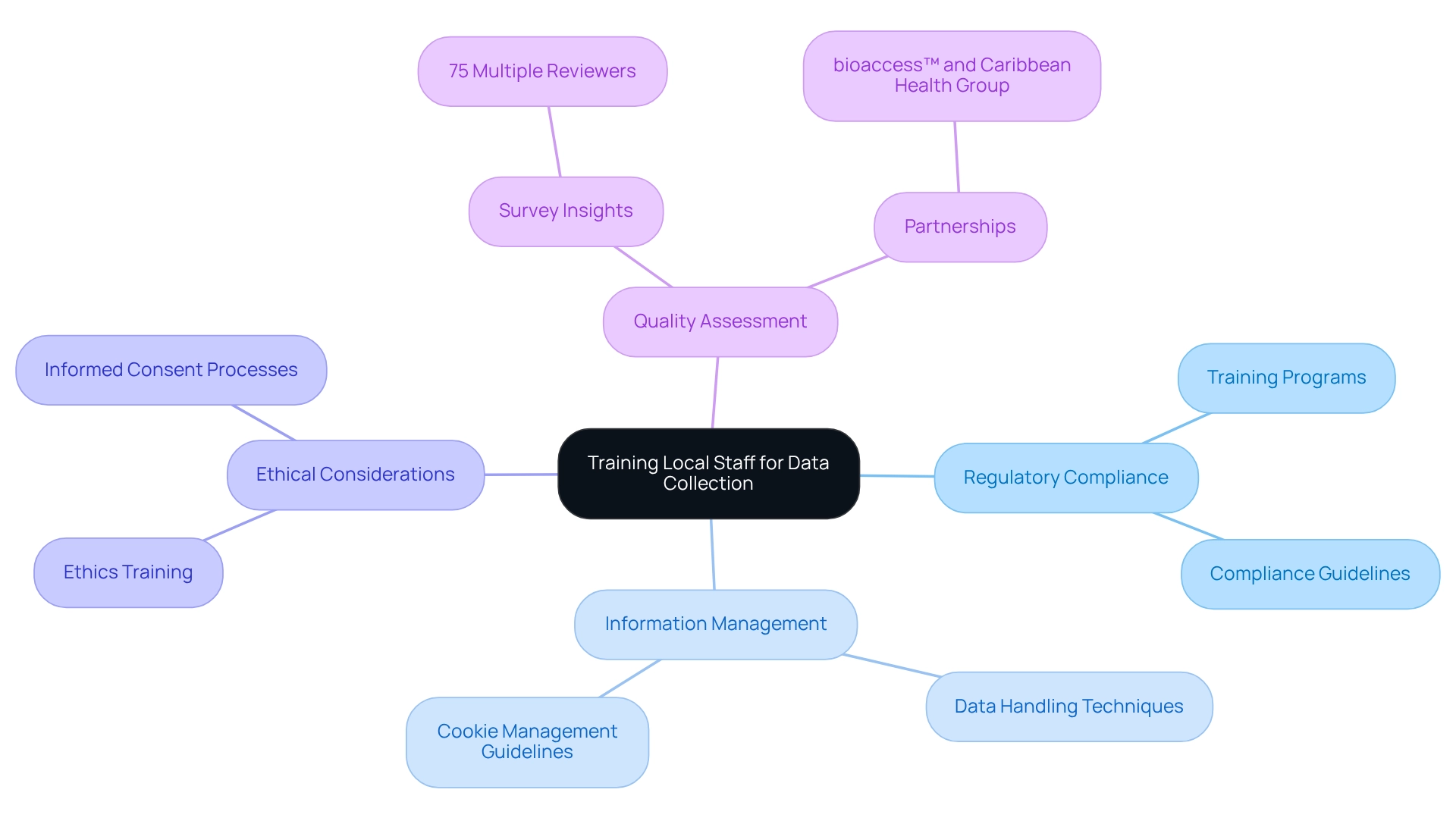
Implement Continuous Monitoring and Evaluation of Trials
This system employs a comprehensive approach for the ongoing observation and assessment of medical studies, which is vital for upholding the integrity and quality of research. It includes regular information audits, safety evaluations, and compliance checks, ensuring strict adherence to established protocols and regulatory standards. By proactively identifying and resolving potential concerns, this system significantly enhances the overall quality of experiments, leading to more reliable outcomes.
The importance of information audits cannot be overstated; they serve as a crucial method for safeguarding the integrity of research. Effective information audit techniques involve systematic evaluations of data collection procedures and real-time oversight of experimental activities. For instance, ongoing observation in medical studies has been shown to improve patient safety and data accuracy, as evidenced by recent statistics indicating that organizations adopting these practices experience a 30% reduction in inconsistencies. Furthermore, bioaccess®'s collaboration with Caribbean Health Group aims to position Barranquilla as a premier destination for medical studies in Latin America, supported by Colombia's Minister of Health. This initiative underscores the commitment to advancing global health improvement through international cooperation and innovation in Medtech.
The growing willingness among physicians to incorporate patient-generated information reflects the evolving landscape of research in medicine. As Arthur Conan Doyle astutely warned, 'It is a capital mistake to theorize before one has data,' highlighting the critical need for data integrity in clinical trials. As Neil Armstrong aptly stated, 'Research is creating new knowledge,' reinforcing the essential role of continuous evaluation in advancing medical understanding and innovation within the Medtech sector.
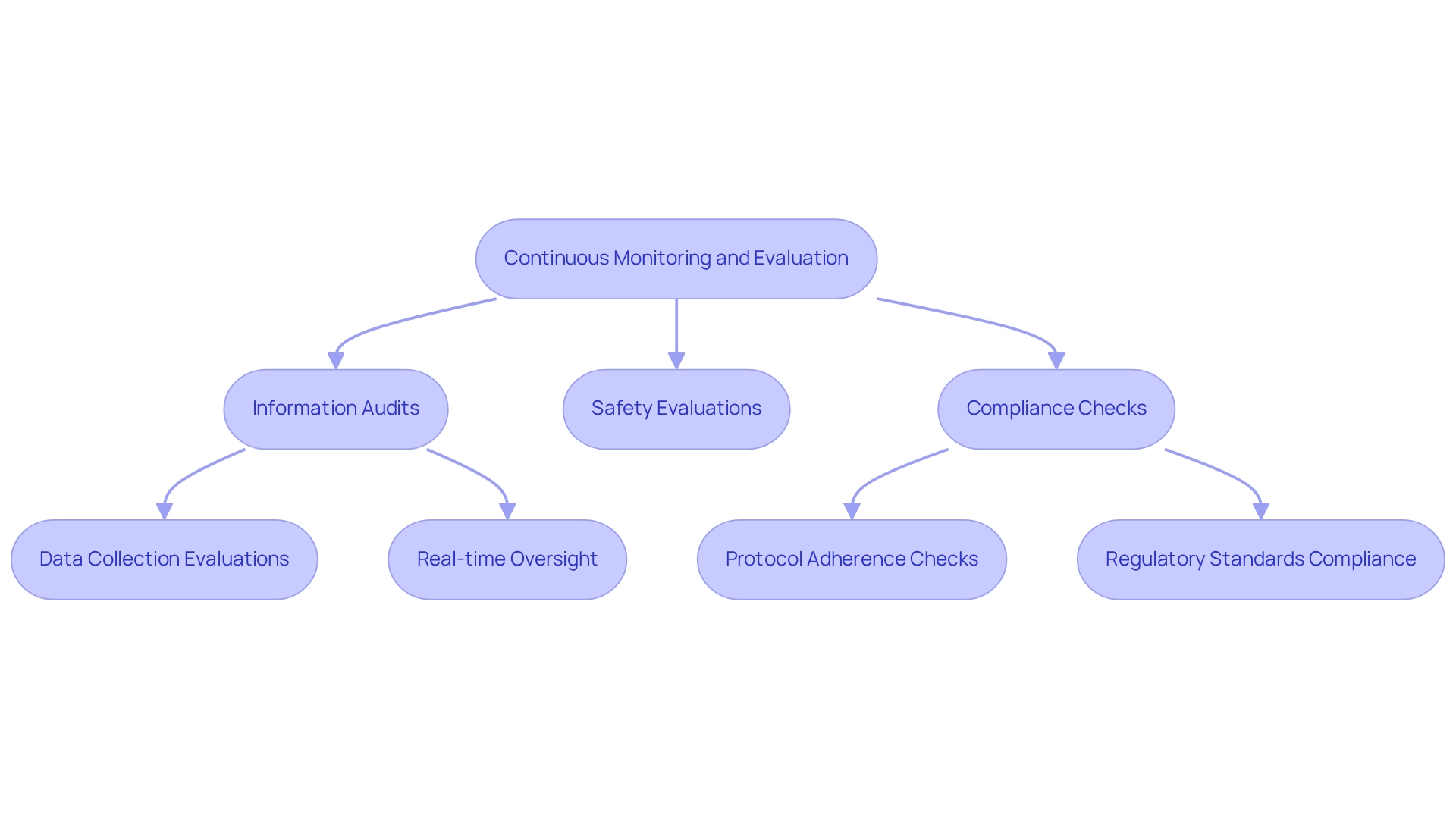
Conclusion
Navigating the complexities of clinical trials in Latin America, particularly in Paraguay, necessitates a multifaceted approach that encompasses regulatory compliance, effective patient recruitment, cultural sensitivity, and robust stakeholder communication. Organizations like bioaccess® have demonstrated their commitment to overcoming these challenges by aligning their strategies with local regulations, fostering community engagement, and enhancing collaboration among all stakeholders. By understanding the nuances of local health practices and leveraging real-world data, bioaccess® not only streamlines trial processes but also ensures that medical innovations are relevant and beneficial to diverse populations.
Moreover, the emphasis on training local staff and implementing continuous monitoring and evaluation processes underscores the importance of quality data collection and adherence to ethical standards. These practices not only improve trial outcomes but also contribute to building trust within communities, which is essential for successful patient recruitment. As regions like Barranquilla position themselves as emerging hubs for clinical research, the proactive strategies employed by bioaccess® serve as a model for others in the Medtech industry.
In conclusion, the integration of local insights, cultural competence, and effective communication plays a pivotal role in advancing clinical trials in Latin America. By prioritizing these elements, organizations can ensure that their efforts lead to meaningful advancements in healthcare, ultimately improving patient outcomes and fostering innovation in medical technology across the region.
Frequently Asked Questions
What is the significance of understanding Paraguay's regulatory landscape for Medtech companies?
A profound understanding of Paraguay's regulatory landscape is crucial for Medtech companies as it allows them to align their processes with local regulations, facilitating effective navigation through the complexities of approval processes.
How does DINAVISA influence the approval process for medical devices in Paraguay?
DINAVISA, the national health authority, establishes specific requirements that are essential for expediting the approval process for medical devices, making it critical for companies to comprehend these intricacies.
What challenges and opportunities does the evolving regulatory framework present for 2025?
The evolving regulatory framework presents challenges in designing trials in Paraguay, but it also offers opportunities for market entry. Companies that adapt to these changes can significantly reduce their time to market for new medical devices.
What services can improve approval timelines for medical studies in Paraguay?
Services that can improve approval timelines include feasibility assessments, site selection, compliance evaluations, study setup, and project oversight.
What recent trend has been observed regarding investment in Paraguay's Medtech market?
The investment in Paraguay by CIFARMA has shown an annual increase of 10%, indicating a growing interest in the market.
How does community engagement impact patient recruitment for medical studies?
Effective patient recruitment strategies that prioritize community engagement can lead to a 15-20% yearly rise in research participation, highlighting the importance of involving communities in the research process.
What role does cultural sensitivity play in designing clinical trials in Paraguay?
Incorporating cultural sensitivity into study design is essential for understanding local beliefs and health practices, which can significantly improve recruitment and retention rates in studies.
How does bioaccess® ensure effective patient recruitment?
Bioaccess® employs a comprehensive strategy that includes community engagement, collaboration with local healthcare providers, and targeted outreach initiatives, leveraging digital platforms for broader reach.
What are the key management services offered by bioaccess® for clinical studies?
Bioaccess® provides extensive management services, including feasibility assessments, site selection, compliance evaluations, study setup, import permits, project oversight, and reporting.
Why is trust-building important in the context of medical research in diverse communities?
Trust-building is vital for gathering diverse and representative data, ultimately enhancing the quality and reliability of research outcomes, especially in communities that have historically experienced distrust in medical research.




